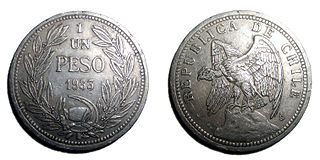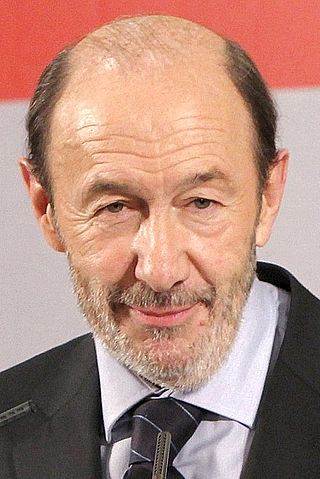
The territory of Chile has been populated since at least 3000 BC. By the 16th century, Spanish conquistadors began to colonize the region of present-day Chile, and the territory was a colony between 1540 and 1818, when it gained independence from Spain. The country's economic development was successively marked by the export of first agricultural produce, then saltpeter and later copper. The wealth of raw materials led to an economic upturn, but also led to dependency, and even wars with neighboring states. Chile was governed during most of its first 150 years of independence by different forms of restricted government, where the electorate was carefully vetted and controlled by an elite.

Francisco Ramón de Vicuña Larraín was a Chilean political figure. He served twice as acting President of Chile in 1829. Francisco Vicuña was of Basque descent.

Diego José Pedro Víctor Portales y Palazuelos was a Chilean statesman and entrepreneur. As a minister of president José Joaquín Prieto's government, he played a pivotal role in shaping the state and politics in the 19th century, delivering with the Constitution of 1833 the framework of the Chilean state for almost a century. Portales' influential political policies included unitarianism, presidentialism and conservatism which led to the consolidation of Chile as a constitutional, authoritarian republic with the franchise restricted to upper class men.

José Balta y Montero was a Peruvian soldier and politician who served as the 19th President of Peru from 1868 to 1872. He was the son of John Balta Bru and Agustina Montero Casafranca.

The economy of Chile has shifted substantially over time from the heterogeneous economies of the diverse indigenous peoples to an early husbandry-oriented economy and finally to one of raw material export and a large service sector. Chile's recent economic history has been the focus of an extensive debate, as it pioneered neoliberal economic policies.

The decolonization of the Americas occurred over several centuries as most of the countries in the Americas gained their independence from European rule. The American Revolution was the first in the Americas, and the British defeat in the American Revolutionary War (1775–1783) was a victory against a great power, aided by France and Spain, Britain's enemies. The French Revolution in Europe followed, and collectively these events had profound effects on the Spanish, Portuguese, and French colonies in the Americas. A revolutionary wave followed, resulting in the creation of several independent countries in Latin America. The Haitian Revolution lasted from 1791 to 1804 and resulted in the independence of the French slave colony. The Peninsular War with France, which resulted from the Napoleonic occupation of Spain, caused Spanish Creoles in Spanish America to question their allegiance to Spain, stoking independence movements that culminated in various Spanish American wars of independence (1808–33), which were primarily fought between opposing groups of colonists and only secondarily against Spanish forces. At the same time, the Portuguese monarchy fled to Brazil during the French invasion of Portugal. After the royal court returned to Lisbon, the prince regent, Pedro, remained in Brazil and in 1822 successfully declared himself emperor of a newly independent Brazilian Empire.

The Chilean War of Independence was a military and political event that allowed the emancipation of Chile from the Spanish Monarchy, ending the colonial period and initiating the formation of an independent republic.

The Crossing of the Andes was one of the most important feats in the Argentine and Chilean wars of independence, in which a combined army of Argentine soldiers and Chilean exiles invaded Chile crossing the Andes range separating Argentina from Chile, leading to Chile's liberation from Spanish rule.
Anselmo de la Cruz y Bahamonde was a Chilean political figure. He served several times as minister and participated actively in the war of independence in that country.

Joaquín Tocornal Jiménez (1788–1865) was a Chilean political figure. He served several times as minister, and participated actively in the war of independence in that country.

Alfredo Pérez Rubalcaba was a Spanish statesman, politician and chemist who served as Deputy Prime Minister of Spain from 2010 to 2011, and previously as Minister of Education from 1992 to 1993, as Minister of the Presidency from 1993 to 1996, as Minister of the Interior from 2006 to 2011 and as acting Minister of Defence between May and June 2008.

Antonio José de Irisarri Alonso, was a Guatemalan statesman, journalist, and politician who served as Interim Supreme Director of Chile in 1814. He is considered one of the fathers of Chilean journalism together with Fr. Camilo Henríquez.

The Ministry of Finance of Chile is the cabinet-level administrative office in charge of managing the financial affairs, fiscal policy, and capital markets of Chile; planning, directing, coordinating, executing, controlling and informing all financial policies formulated by the President of Chile.

Between 1830 and 1850, Chilean silver mining grew at an unprecedented pace which transformed mining into one of the country's principal sources of wealth. The rush caused rapid demographic, infrastructural, and economic expansion in the semi-arid Norte Chico mountains where the silver deposits lay. A number of Chileans made large fortunes in the rush and made investments in other areas of the economy of Chile. By the 1850s, the rush was in decline and lucrative silver mining definitively ended in the 1870s. At the same time, mining activity in Chile reoriented to saltpetre operations.

Jean-Georges Humann was a French financier and politician. During the July Monarchy (1830–1848) he was several times Minister of Finance.

Pedro Sánchez Pérez-Castejón is a Spanish politician who has been Prime Minister of Spain since June 2018. He has also been Secretary-General of the Spanish Socialist Workers' Party (PSOE) since June 2017, having previously held that office from 2014 to 2016, and was elected President of the Socialist International in November 2022.

Manuel Rengifo Cardenas was a Chilean politician.

The Royal University of San Felipe was a university created by King Philip V in 1738, in territory which was then part of the Kingdom of Spain. It was officially founded in Santiago in 1747 and began teaching activities in 1758. It is the immediate predecessor of the University of Chile (1843).

The Ministry of Economy and Finance is a ministry of the government of Venezuela with similar portfolios dating back to 1810 with the creation of a tax office. When Gran Colombia was dissolved and Venezuela assumed its independence, the Ministry of Finance was created in 1830 when General José Antonio Páez commissioned the establishment of the public business office to three Secretariats of State: Interior, Justice and Police, War and Navy, Finance, and Foreign Relations. The current minister has been Delcy Rodríguez since September 2020.


















